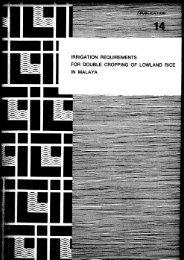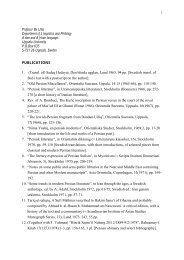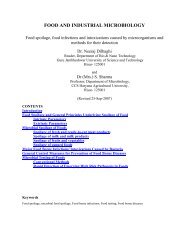On the Future of Indigenous Traditions - Munin
On the Future of Indigenous Traditions - Munin
On the Future of Indigenous Traditions - Munin
Create successful ePaper yourself
Turn your PDF publications into a flip-book with our unique Google optimized e-Paper software.
is distinguished from law, in that it need not to be enforced by <strong>the</strong> state or by legal<br />
penalties; from convention, in that it need not be exact or rule- guided…” 36<br />
The question <strong>the</strong>n is when does custom become a law, or in o<strong>the</strong>r words, are <strong>the</strong>re<br />
certain customs behind making <strong>of</strong> <strong>the</strong> laws? The answer is, first that, a custom,<br />
whe<strong>the</strong>r good or bad according to Scruton’s interpretation, “to do what is customary is<br />
to act intentionally, and for a specific reason, namely, that is what is done.” However,<br />
with regard to customs being responsible in formation <strong>of</strong> laws, he fur<strong>the</strong>r says,<br />
“customs from a background from which law may emerge, as crystallization <strong>of</strong> settled<br />
expectation.” 37 Thus, we have today <strong>the</strong> laws and also <strong>the</strong> customary laws.<br />
In <strong>the</strong> discussion <strong>of</strong> customs and customary laws <strong>of</strong> <strong>the</strong> historical communities,<br />
indigenous peoples, and groups, generally <strong>the</strong> use <strong>of</strong> <strong>the</strong> term customary system or<br />
customary law needs more clarification both for its literary use as well as in <strong>the</strong> legal<br />
sense. In a broader sense customary law according to Bekker is, “…an established<br />
system <strong>of</strong> immemorial rule which had evolved from <strong>the</strong> way <strong>of</strong> life and natural wants<br />
<strong>of</strong> <strong>the</strong> people, <strong>the</strong> general context <strong>of</strong> which was common knowledge, coupled with<br />
precedents applying to special cases, which were retained in <strong>the</strong> memories <strong>of</strong> <strong>the</strong> chief<br />
and his consolers, <strong>the</strong>ir son’s and <strong>the</strong>ir son’s sons (sic), until forgotten, or until <strong>the</strong>y<br />
become a part <strong>of</strong> <strong>the</strong> immemorial rules…” 38<br />
Never<strong>the</strong>less, not all <strong>the</strong> customary laws <strong>of</strong> today are ancient, nor are all <strong>the</strong><br />
customary laws administered by chiefs. However, this definition gives us a basic idea<br />
<strong>of</strong> what is generally understood by customary law.<br />
From <strong>the</strong>se explanations we can conclude that <strong>the</strong> customary system or law is a<br />
certain set <strong>of</strong> rules and principles agreed with common consciousness which is more<br />
voluntary in nature for its practical applicability by <strong>the</strong> members <strong>of</strong> that community.<br />
In o<strong>the</strong>r words, custom can be defined as collectively sanctioned behaviour <strong>of</strong> <strong>the</strong><br />
member <strong>of</strong> <strong>the</strong> particular community or group which has been transmitted from one<br />
36<br />
Roger Scruton, “Custom”, A Dictionary <strong>of</strong> Political Thought, London: Pan Book Ltd. with <strong>the</strong><br />
Macmillan Press 1982, 110.<br />
37<br />
Ibid.<br />
38<br />
J.C. Bekker, Seymour’s Customary Law in South Africa (Cape Town: Jeta & Co. Ltd, 1989), 11.<br />
32

















